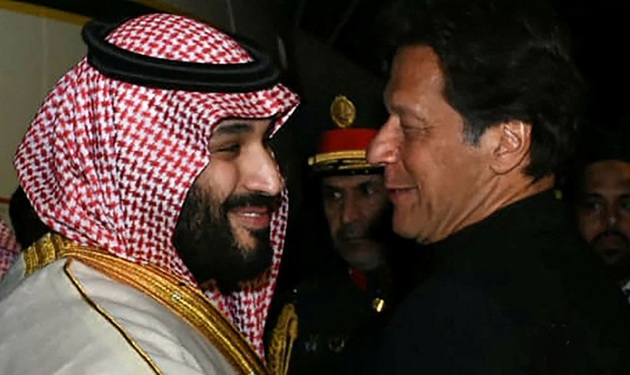Riyadh bids to ‘clear the air’ with Islamabad and build a front against regional rival Tehran. Saudi Arabia has agreed to restart oil aid to Pakistan worth at least $1.5bn annually in July, according to officials in Islamabad, as Riyadh works to counter Iran’s influence in the region.
Financial Times repots that Riyadh demanded that Pakistan repay a $3bn loan last year after Islamabad pressured Saudi Arabia to criticise India’s nullification of Kashmir’s special status. But the acrimony between the two longtime allies has eased after Imran Khan, the prime minister, met Saudi Crown Prince Mohammed bin Salman in May.
News of the oil deal with Pakistan comes as Saudi Arabia embarks on a diplomatic push with the US and Qatar to build a front against Iran, said analysts. Riyadh lifted a three-year blockade of Qatar in January in what experts said was an attempt to curry favour with the newly elected Joe Biden. Pakistan had shifted closer to Saudi Arabia’s regional rivals Iran and Turkey, which, along with Malaysia, have sought to establish a Muslim bloc to rival the Saudi-led Organisation of Islamic Cooperation.
Khan has developed a strong rapport with President Recep Tayyip Erdogan, encouraging Pakistanis to watch the Turkish historical television series Dirilis Ertugrul (Ertugrul’s Resurrection) for its depiction of Islamic values. Ali Shihabi, a Saudi commentator familiar with the leadership’s thinking, said that “bad blood” had accumulated between Riyadh and Islamabad, but recent bilateral meetings had “cleared the air” and reset relations to the extent that oil credit payments would restart soon.
A senior Pakistan government official said: “Our relations with Saudi Arabia have recovered from [a downturn] earlier. Saudi Arabia’s support will come through deferred payments [on oil] and the Saudis are looking to resume their investment plans in Pakistan.” The Saudi offer is less than half of the previous oil facility of $3.4bn, which was put on hold when ties frayed.
But Fahad Rauf, head of equity research at Ismail Iqbal Securities in Karachi, said: “Any amount of dollars helps because time and again we face a current account crisis. And with these prices north of $70 a barrel anything helps.” Pakistan’s foreign reserves were more than $16bn in June compared with about $7bn in 2019 before it entered its $6bn IMF programme.
Robin Mills at consultancy Qamar Energy said: “Saudi Arabia and Pakistan are allies, but their relationship has always been rocky. And the Pakistan-Iran relationship is better than you might think.” Mills said that the timing of the Saudi gesture was “interesting” given that Iran was preparing to step up oil exports with the US considering easing sanctions. “The Saudis are on a bridge-building mission more generally. They have sought to mend fences with the US and there is also the resumption of relations with Qatar,” he said.
Ahmed Rashid, an author of books on Afghanistan, Pakistan and the Taliban, said that there were a variety of factors that might have spurred Riyadh to restart the oil facility. It may be “partially linked to the American need for bases” to launch counter-terrorism attacks in Afghanistan from Pakistan, he said, but added that its priority was probably to prevent Islamabad from falling under Tehran’s influence.
Rashid pointed out that Pakistan was caught between China, which has invested billions of dollars in infrastructure projects, and the US. “Pakistan has to play it carefully, it is dependent on China for the Belt and Road, dependent on the west for loans,” said Rashi. “This is a very complex game.”






